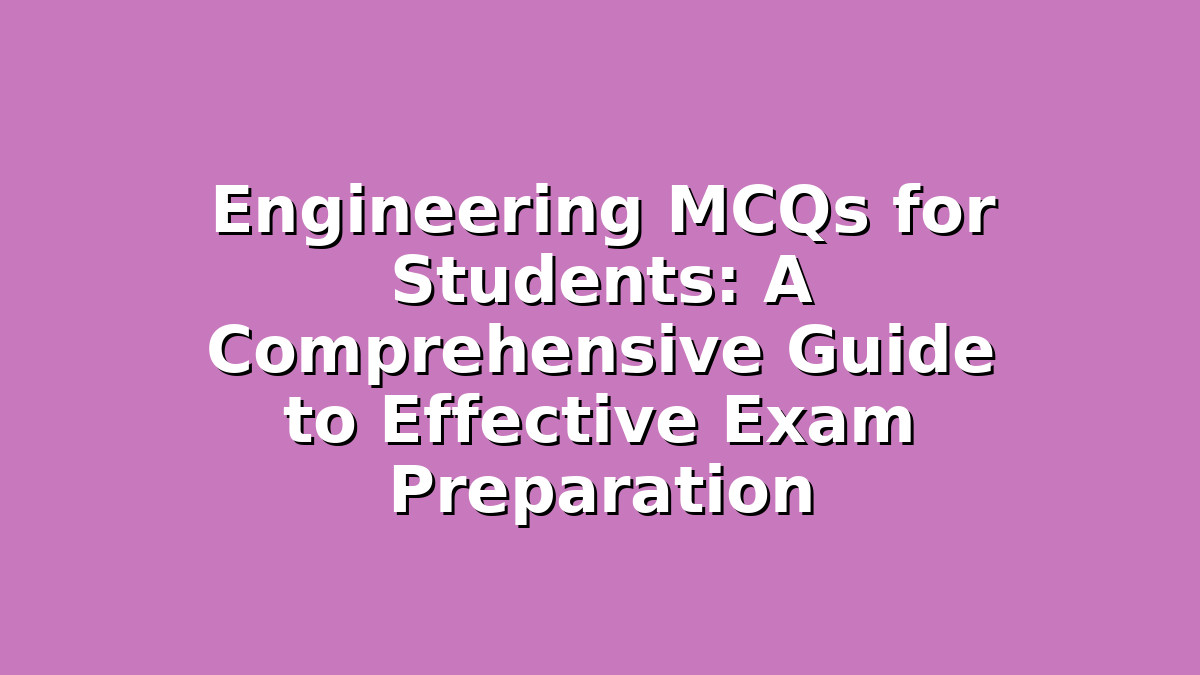Preparing for engineering exams can be both exciting and challenging. Whether you are a freshman tackling your first set of technical subjects or a senior preparing for your final exams, mastering the concepts is crucial to your success. One of the most effective ways to reinforce learning and check your understanding is through practicing Multiple Choice Questions (MCQs). Engineering MCQs are widely used in exams, quizzes, and competitive tests, making them an essential part of your study toolkit.
In this article, we will explore how MCQs can help you excel in your engineering studies. We’ll share practical study tips to maximize your learning from MCQs and provide strategies to boost your confidence on exam day. Let’s dive in!
Why Engineering MCQs Are Important for Students
Engineering subjects often involve complex theories, formulas, and problem-solving techniques. MCQs serve as an excellent assessment tool because they test not only your knowledge but also your ability to apply concepts quickly and accurately.
Some key benefits of using MCQs for your exam preparation include:
– Focused Revision: MCQs highlight important topics and common pitfalls.
– Improved Time Management: Practicing timed MCQ tests trains you to think quickly.
– Instant Feedback: MCQ quizzes provide immediate results, helping you identify weak areas.
– Boosted Confidence: Regular practice reduces exam anxiety by familiarizing you with question formats.
By integrating MCQs into your study routine, you can actively engage with the material and make your revision more interactive and effective.
—
Section 1: How to Effectively Use Engineering MCQs for Studying
Simply reading MCQs isn’t enough; you need a structured approach to fully benefit from them.
a) Start with Topic-Wise MCQs
Break down your syllabus into manageable topics such as Thermodynamics, Circuit Theory, Fluid Mechanics, or Structural Analysis. Practice MCQs for each topic individually before attempting full-length tests. This method helps you build strong fundamentals and identify specific areas needing improvement.
b) Use Quality Study Material
Not all MCQs are created equal. Choose reputable sources like university question banks, engineering textbooks, or trusted online platforms. Well-designed MCQs cover key concepts and challenge your understanding rather than test rote memorization.
c) Analyze Your Mistakes
After attempting MCQs, take time to review every incorrect answer. Understand why the right option is correct and why the wrong ones are misleading. This critical analysis deepens your conceptual clarity and prevents repeating errors.
d) Maintain an Error Log
Keep a notebook or digital document listing tricky questions or concepts you struggled with. Revisit this log regularly for focused revision, turning your weaknesses into strengths.
—
Section 2: Incorporating MCQs into a Balanced Study Schedule
Balancing MCQ practice with other study methods ensures comprehensive exam readiness.
a) Combine MCQs with Conceptual Learning
While MCQs test recall and application, they work best when paired with detailed study of theory and problem-solving exercises. Spend time reading textbooks, attending lectures, and solving numerical problems to build a strong foundation.
b) Set Realistic Targets
Plan daily or weekly MCQ practice goals based on your syllabus and exam timeline. For example, attempt 20-30 MCQs per day on a particular subject, gradually increasing difficulty and volume as your confidence grows.
c) Simulate Exam Conditions
Periodically, take full-length MCQ tests within a fixed time frame to mimic actual exam settings. This practice helps improve your pacing, stress management, and ability to handle exam pressure.
d) Group Study and Discussion
Engaging with peers by discussing MCQs can broaden your perspective. Sometimes, other students’ explanations or approaches reveal insights you might have missed.
—
Section 3: Tips to Master Engineering MCQs and Excel in Exams
Success in MCQ-based engineering exams requires more than just knowledge. Here are some practical tips to help you maximize your performance:
a) Read Questions Carefully
Engineering MCQs often include tricky wording or negative terms such as “NOT,” “EXCEPT,” or “LEAST.” Always read the question thoroughly to avoid misinterpretation.
b) Eliminate Wrong Answers
Use the process of elimination to narrow down your choices. Even if you are unsure about the correct answer, ruling out obviously wrong options improves your chances.
c) Time Management
Don’t spend too long on any single question. If unsure, mark it and move on, then return if time permits. This approach ensures you answer maximum questions.
d) Practice Regularly
Consistency is key. Frequent MCQ practice reinforces memory and builds exam temperament, so make it a daily habit.
e) Stay Calm and Confident
Positive mindset significantly impacts exam results. Trust your preparation, stay calm, and approach each question with confidence.
—
Conclusion
Engineering MCQs are a powerful tool to sharpen your understanding, improve recall, and prepare efficiently for exams. By adopting a strategic approach—practicing topic-wise MCQs, analyzing mistakes, balancing study methods, and honing exam skills—you can greatly enhance your academic performance.
Remember, success in engineering exams isn’t just about hard work; it’s about smart work. Use MCQs wisely as part of your study plan, stay consistent, and maintain a positive attitude. You have the potential to excel, and with the right preparation, your engineering dreams are within reach!
Good luck with your studies and exams!

Responses